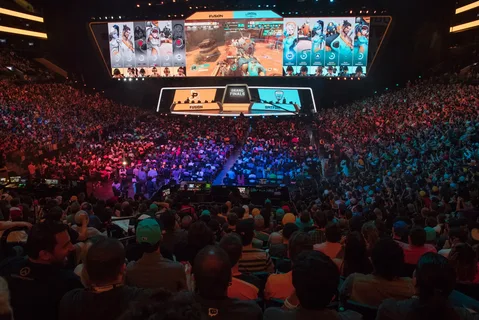The E-Sports industry is more than just an entertainment powerhouse; it’s a thriving digital ecosystem uniting millions of gamers, creators, and fans worldwide. With competitive gaming now attracting packed arenas, massive streaming audiences, and billion-dollar investments, bringing these communities together has never been more important. Enter E-Sports networks—platforms designed not only to connect players but
The E-Sports industry is more than just an entertainment powerhouse; it’s a thriving digital ecosystem uniting millions of gamers, creators, and fans worldwide. With competitive gaming now attracting packed arenas, massive streaming audiences, and billion-dollar investments, bringing these communities together has never been more important. Enter E-Sports networks—platforms designed not only to connect players but to nurture the global gaming community.
This post will explore how E-Sports networks act as a bridge for gamers, creators, and fans. We’ll walk you through key features, successful platforms, and what the future holds for this interconnected gaming world.
What Are E-Sports Networks?

Image by Yandex.com
E-Sports networks are purpose-built platforms fostering collaboration, competition, and connection in the gaming sphere. These digital hubs encompass services like live streaming, community engagement, matchmaking, and content creation tools.
Whether you’re tuning in to a global tournament, hosting a scrimmage, or sharing your latest gameplay tips, E-Sports networks provide a space where passion for gaming can thrive—together.
Why Are They Crucial?
Gaming is inherently social, but fragmented platforms and disconnected systems can dilute the experience. E-Sports networks bring cohesion, making it easier for players to compete, creators to share, and fans to engage. Whether you’re refining your skills with matchmaking services or sharing a laugh across Discord servers, these networks form the backbone of today’s gaming world.
Key Features of E-Sports Networks
To understand the appeal of these networks, we need to look at their core features:
1. Live Streaming Platforms
Live streams are the heartbeat of E-Sports networks, with platforms like Twitch allowing players to broadcast their matches to millions. This feature doesn’t just entertain—it empowers a direct connection between players and their audiences.
- Example: Twitch transformed streaming into a cultural phenomenon. Top streamers turned gaming into full-time careers by creating entertaining experiences that bridge entertainment and competition.
- Fun Fact: Twitch’s success has even extended into music, creative arts, and live podcasts.
2. Community Building & Engagement Tools
E-Sports networks excel at creating communities where fans can gather, connect, and share. Tools promoting discussions, forums, and interactive features foster a sense of belonging among users.
- Example: Discord has revolutionized how gamers communicate. Originating as an alternative to clunky in-game chats, Discord now spans countless “servers” across topics and industries.
- Highlight: Growth hasn’t diluted Discord’s grassroots ethos. You’ll still find niche communities as memorable as their emote-filled conversations.
3. Matchmaking Services
Without quality matchmaking, competitive gaming would diminish. E-Sports networks like FACEIT provide intuitive matchmaking to ensure fair competition and bring worthy opponents together.
- Example: FACEIT has become the go-to platform for competitive titles like CS:GO and Dota 2. It helps amateur players climb league ladders while seamlessly transitioning pros into major tournaments.
4. Content Creation Support
Being a successful gamer today goes beyond just playing—it’s about building an audience. From beginner blogs to monetized videos, E-Sports networks offer creators tools to share their voice.
- Example: YouTube Gaming enables live streaming, audience engagement, and ad revenues. Platforms like Outplayed even allow creators to clip highlights directly from gameplay seamlessly.
Examples of Successful E-Sports Networks

Image by Yandex.com
These platforms are worth exploring for anyone immersed in the gaming world:
1. Twitch
Twitch evolved into a phenomenon that stretches far beyond its gaming roots. Initially tailored for broadcasting gameplay, the platform now entertains with art demos, cooking classes, and esports tournaments. Twitch’s focus on community interaction through chats has played a massive role in making fans feel part of the experience.
- Achievements:
- Surpassed 140 million monthly active users.
- Hosts events ranging from grassroots tournaments to international titles like the League of Legends World Championship.
2. Discord
Starting as a communications software primarily for gamers, Discord exploded into an all-encompassing hub. With voice chats, text groups, and customizable servers, its structure is perfect for fostering micro-communities.
- Achievements:
- Over 150 million active users engaging in gaming and non-gaming topics.
- Expanded relevance for schools, businesses, and hobby groups.
3. FACEIT
FACEIT bridges the gap between casual and professional gaming with its matchmaking services and tournaments. Amateur gamers gain visibility through ranked ladders, and many top-tier E-Sports professionals began their careers here.
- Achievements:
- Hosted tournaments with multi-million-dollar prize pools.
- Recognized for offering a path to professional gaming careers.
4. ESL Gaming
The oldest and largest E-Sports platform, ESL Gaming, shapes competitive gaming on a global scale. From online hubs to packed arenas, their initiatives promote inclusivity and elevate gaming culture.
- Achievements:
- Hosts prestigious leagues like the ESL Pro League and Intel Extreme Masters.
- Valued for its efforts in global inclusivity via lower-tier “open” leagues.
The Future of E-Sports Networks
E-Sports isn’t slowing down. And if networks continue adapting alongside technology, the future of gaming is brighter than ever.
1. Technological Advancements
Emerging tech like AR, VR, and blockchain will redefine gaming connections. Imagine streaming an E-Sport event in VR while cheering alongside fans worldwide—all from your living room.
2. Global Reach & Inclusivity
E-Sports are becoming a unified language. With internet accessibility improving globally, players from regions with lower representation (e.g., Africa, South America) are finding platforms to shine.
3. Emerging Trends
Brands are also getting more involved—expect to see corporate sponsorships, influencer partnerships, and deeper integrations with pop culture.
A New Era for Gaming Connectivity

Image by Yandex.com
E-Sports networks represent more than convenient tools for gamers—they embody the ethos of connection, community, and growth. Their rapid evolution ensures that gamers, creators, and fans will always find a home to thrive in the vibrant digital world of competitive gaming.
Whether you’re a pro aiming for the next big tourney or a fan eager to engage with your favorite streamer, now’s the time to get involved. Join the community, interact, and tell us what E-Sports means to you.
The gaming world awaits—are you ready to connect?
















